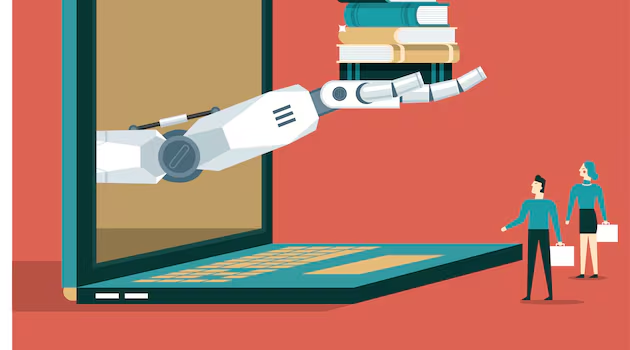
“It’s a beautiful thing, the destruction of words.” This line from George Orwell’s book 1984 sets the tone for the discussion on Artificial Intelligence (AI), particularly Generative AI. While powerful, it could unintentionally erode the richness of language, originality, and critical thinking in education. Unesco defines Gen AI as “an artificial intelligence technology that automatically generates content in response to prompts written in natural-language conversational interfaces”.
The power of the prompt is reshaping higher education at an unprecedented pace. Universities in Ireland, the EU and beyond are rapidly integrating AI into teaching, learning and assessments. However, as we embrace its benefits, we must pause and ask: Are we empowering students or outsourcing the skills we aim to cultivate?
AI literacy is essential for preparing students to succeed in a future shaped by this technology. This involves not only technical proficiency but also the ability to understand AI concepts, apply them across different contexts, and evaluate AI outputs. It must be complemented by soft skills such as ethical reasoning and empathy, which support the responsible development and use of AI. Although AI is not a new technology, it permeates our daily lives, from education and industry to personal interactions. Its influence is inevitable, bringing both opportunities and challenges that require thoughtful engagement.
Students are increasingly using AI tools to write, research and revise. These tools can improve accessibility, offer interactive and personalised feedback and support diverse learning styles. However, there are also concerns – they may lead to reduced effort and a loss of “voice” due to reliance on AI-generated content, blurring the boundaries of authorship.
As educators, we cannot ignore the influence of AI. Its integration extends beyond campuses into every workplace, making it crucial to emphasise ethical AI in education. A balanced approach is necessary, one that empowers students to work with advanced automation while cultivating sound judgment. This balance involves using AI as a tool to scaffold learning, rather than a crutch that replaces thinking.
[ A Brave New Ireland: How dystopias can reflect the state of Ireland and the WestOpens in new window ]
If, as Orwell warns, mechanised language undermines independent thought, then our methods of assessing learning must adapt accordingly. This shift challenges educators to revisit traditional assessment practices. Assessments vulnerable to AI misuse must be redesigned to promote ethical and appropriate engagement. The educator’s role is expanding from instructor to facilitator and mentor, guiding students from passive learners to active, independent, and collaborative thinkers.
By incorporating generative AI into assessment design, alongside clear frameworks, and guidance, we can uphold academic integrity and promote lifelong learning. AI offers opportunities for interactivity, creativity and experimentation. When used correctly, it can enable practical and transparent assessments that teach students not just how to use AI, but how to do so ethically and adaptively in a changing world.
[ How confident can we be that scientists’ awesome powers will be used for good?Opens in new window ]
Bridging AI use with practical relevance requires strategic partnerships between education and industry to ensure academic learning is rooted in principled and professional standards. Collaborating with universities provides businesses with a talent pipeline that is not only technically proficient but also understands responsible AI use. Students gain exposure to real-world challenges through projects and mentorship from industry professionals, extending their learning beyond the classroom. This synergy enhances workforce readiness and fosters innovation in a rapidly evolving job market.
Jean Noonan.
The transformative power of AI in education has two sides to the coin, one of immense potential and the other of profound responsibility. As universities adopt AI, we must continue to revisit the question: Are we empowering students or outsourcing the skills we aim to cultivate? Ultimately, education must be guided by ethics, innovation and reflection, to ensure AI enhances rather than diminishes the intellectual journey of university.
Orwell’s haunting words, “It’s a beautiful thing, the destruction of words,” should serve not as prophecy fulfilled but as a warning to heed. In embracing AI, we must not sacrifice skills that define us, including our language, critical thought, and capacity to question. The future of education and society depends on our ability to preserve human skills as we adapt to technological change.
[ Kurt Vonnegut’s dystopian future has come to passOpens in new window ]
As a lecturer preparing students for the commercial environment and a Digital Business Ireland advisory member, it’s clear that AI education is the foundation of Ireland’s digital future. Universities must equip students with the skills to responsibly apply AI, while government-supported upskilling and reskilling initiatives ensure today’s workforce remains competitive.
Embedding AI literacy across academia and industry is essential to educating students to the highest possible standards and instilling habits that will sustain them in whatever career they pursue.
Jean Noonan is a member of the Digital Business Ireland Advisory Council, and an Assistant Lecturer in the School of Business Technology, Retail, and Supply Chain at TU Dublin
Source





